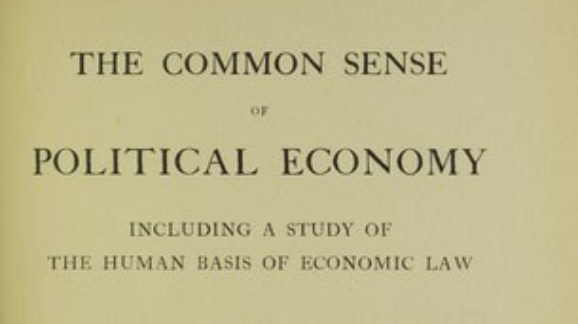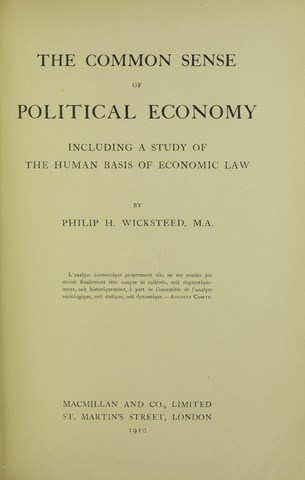Retro Reviews: Common Sense Political Economy

 The following, originally published at Inertia Wins, is a review of Philip Henry Wicksteed’s 1910 textbook The Common Sense of Political Economy. Wicksteed was a leading economic writer of his day, but also an intellectual of wide-ranging interests and a Unitarian minister. See the Retro Reviews series main post for more content.
The following, originally published at Inertia Wins, is a review of Philip Henry Wicksteed’s 1910 textbook The Common Sense of Political Economy. Wicksteed was a leading economic writer of his day, but also an intellectual of wide-ranging interests and a Unitarian minister. See the Retro Reviews series main post for more content.
I read this 1910 “principle of” textbook because of its influence on James Buchanan, the Nobel laureate who co-founded the public choice approach. He emphasized methodological individualism rather than thinking about people in terms of groups or aggregates. He also emphasized precision in writing and in thought, and repeatedly pointed to Wicksteed as one of his influences in this regard, along with Thomas Hobbes and the Swedish economist Knut Wicksell.
Wicksteed is surprisingly readable. And, as with many other older economics classics I’ve read, from Adam Smith, David Ricardo, and Jean-Baptiste Say on up to Frank Knight, he defies the stereotype of economists thinking only in terms of abstract models and Homo economicus. Wicksteed wrote in a post-Alfred Marshall world, so by his time the now-standard tool kits of supply and demand curves and equilibrium analysis were in wide use. His grasp of thinking at the margin is deep yet seemingly effortless, and has already sharpened my thinking.
But Wicksteed does not use models for their own sake. He uses standard Marshallian theory to explain why people behave as they do, and why economies have certain tendencies in motion. But he repeatedly emphasizes that these are models, not real life. He emphasizes the importance of human psychology, and how fleeting sentiments and emotions can influence decision making in ways Marshallian analysts struggle to explain. The areas under the supply and demand curves describing subjective values such as consumer and producer surplus do not add up in real life nearly so neatly.
The title is also well chosen. Wicksteed shows common sense throughout, and not just in treating models as models, and not as real life. He shows common sense most brightly in calling shenanigans on the confused and confusing views of land and rent that detracted from the accomplishments even of high-caliber thinkers like Adam Smith and Jean-Baptiste Say, as well as Karl Marx and the nuttier parts of Henry George and his followers. He spends an entire chapter debunking such nonsense, and throughout also explains why the common distinction between land, labor, and capital as separate factors of production is arbitrary and artificial. The likely source of this common pre-20th century confusion is the traditional dominance of agriculture in economic life. As manufacturing and services became more important, the land/rent fallacy declined, and Wicksteed appeared at the right moment in history to put a nail in agrarianism’s deserving coffin.
To the extent that Wicksteed has any readers today, they probably came to him the same way I did, via better-known figures such as Buchanan crediting him as an influence. Due to Wicksteed’s emphasis on psychology and limited rationality, today’s behavioral economists would find a lot to like here, too. Harvard-MIT-Princeton analysts would benefit from Wicksteed’s extended proof that rigorous reasoning is possible without extensive math.
Read more at the Retro Review main page.